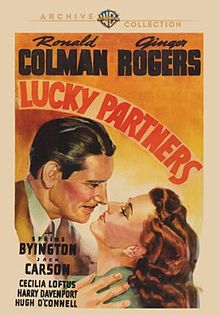
LUCKY PARTNERS
US, 1940, 99 minutes, Black and white.
Ginger Rogers, Ronald Colman, Jack Carson, Spring Byington.
Directed by Lewis Milestone.
Light American comedy romance of the 30s and 40s. It has elements of the screwball comedy made so popular in the thirties by such directors as Frank Capra and Howard Hawks. However, Lewis Milestone, more noted for dramas than for comedy, does not have the verve of Hawks and Capra and so the film meanders somewhat. However, it is light, pleasant and forgettable entertainment. Ginger Rogers and Ronald Colman are unusual pairing, Ginger Rogers at home in this style, Ronald Colman more at home with drama. Interesting for the history of film.
1. How entertaining a romantic comedy? How well did it use the conventions of American comedy?
2. The atmosphere of the early forties, the stars, American dreams of luck and wealth? The picture of the American city, American characters?
3. The tone of the title, the illustration of this by Jean being given the dress, the comedy about the ticket etc?
4. The conventions and pacing and witty dialogue of the screwball comedies of the thirties? How much was this film in that tradition? Its pacing? How seriously did it present itself?
5. Ginger Rogers' style as Jean? How credible a character did she make of Jean? Her background, her work, her Aunt? The initial meeting and the exchange of good luck greetings with David, the incident with the dress? Being engaged to Freddie and the type that Freddie was? David and her hunches? The discussion about buying the ticket with all the conditions, having Freddie present and hoping for a fight over her? The trip and the humour of the mistaken identities, rooms etc.? The romance with the dancing etc? Freddie's arrival and the mix-up? The court case, cross-examination, happy ending? The heroine of an American screwball comedy?
6. The contrast with David and his presence on the street, the mystery of his background and his hiding his identity, art work? Debonair style? The encounter with Jean, discussions about the ticket and his persuasiveness, relationship with Freddie, the trip, the court case and his cross-examination of himself? Ronald Colman's British comedy style?
7. The picture of Freddie as the other man, meekness, shrewdness about the money, suspicions, bashing the door down, the court case, graciously giving in?
8. The supporting cast and their contribution to the comedy? Jean's absent-minded aunt and her getting things mixed up, the hotel personnel, the maid who was frightened, the men in the restaurant, the judge and his rulings in the case?
9. The humour of the comedy routines about the ticket, the hotel rooms, the trip, the arresting police? The sexual innuendo and the atmosphere of French farce with the bedrooms etc?
10. The conventions of the comedy in the court room with dialogue, cross-examinations etc?
11. The patterns of American comedy, standards, taken-for-granted attitudes, right and wrong, heroes and heroines?